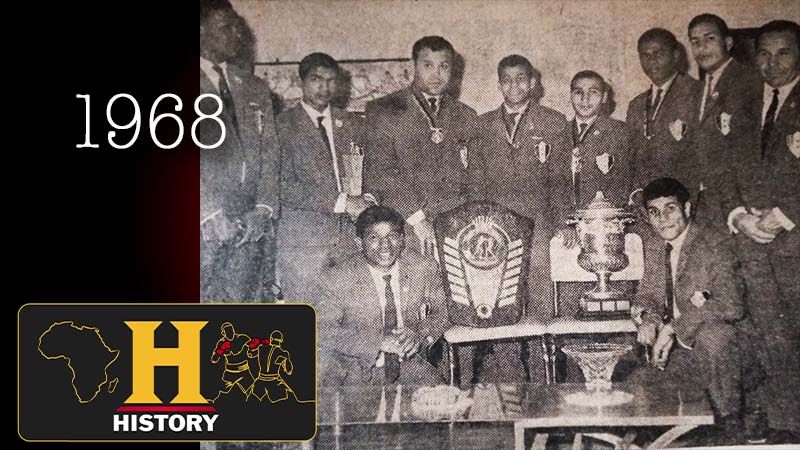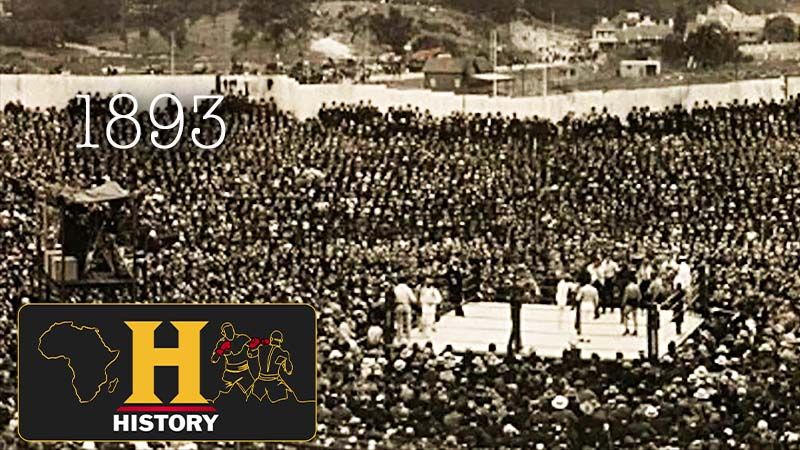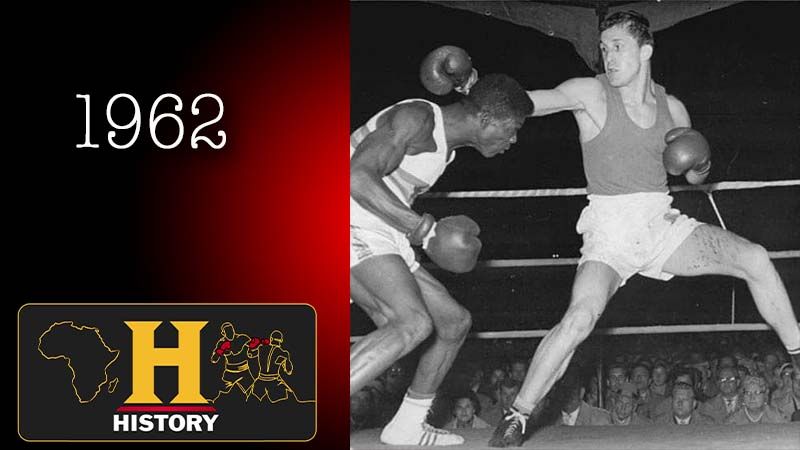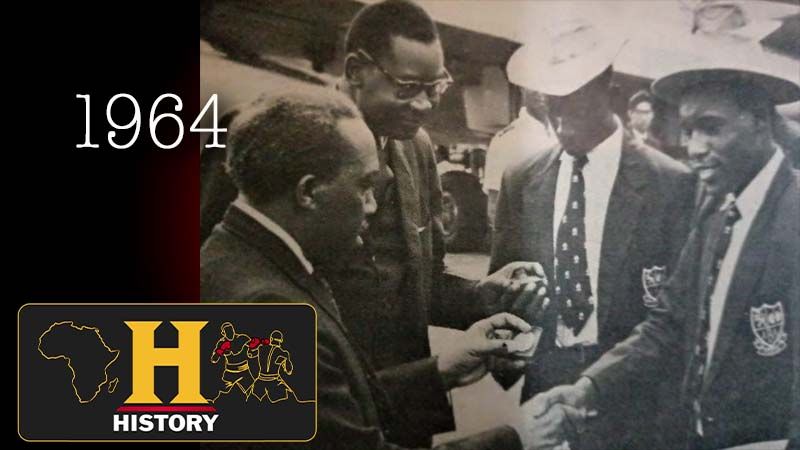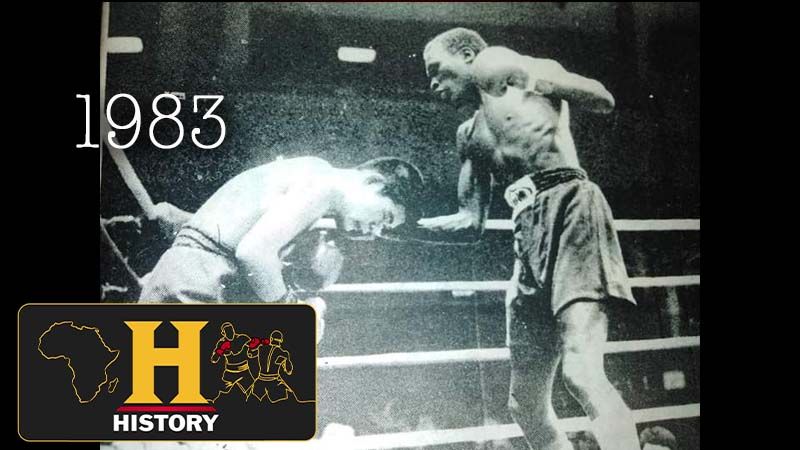1968 Egypt regains title as Kenya and Uganda roar in Lusaka
▪️ Niger surprises, miserable night for defending champion Ghana, who lose their last four fights and DRC wins the first gold medal on their debut. Photo: The Egyptian national team at the Nairobi embassy on their way to Cairo.
Egypt narrowly won the 1968 African Boxing Championships, with Kenya finishing second and Uganda taking third place in Lusaka, Zambia, in the fourth edition of the continental tournament.
The Egyptians, winners of the first African Championships they hosted in 1962 and the second in Ghana in 1964, finished on 13 points, level with Kenya on the same number of points, but won the overall title with one more gold medal than Kenya. Egypt won the Nasser Trophy and the Nkrumah Shield.
Egypt won three gold medals, one silver and two bronze, followed by Kenya 2-1-5, Uganda 2-2-2 12pts, Ghana 0-4-0 8pts, Nigeria 0-2-3 7pts, Niger 2-0-0 6pts, Zambia 0-1-3 6pts.
Again, there is no final medal table from the available archives to get a clear idea of the medal positions. Gold medals were worth three points, silver two points and bronze one point.
Kenya were headed for victory as eight of their boxers made it to the semi-finals but their hopes were dented by five defeats and three – light flyweight Lawrence Kariuki, featherweight Philip Waruinge and light middleweight Steve Thega – making it to the final. Bantamweight Sammy Mbogwa, lightweight Stephen Baraza, light welterweight John Olulu, light heavyweight Stephen “Kimbo” Matiani and heavyweight Hamisi Abdalla all bowed out in the semi-finals.
For the second time in a row, Waruinge was named the best boxer after his masterful performance in which he beat the highly regarded Ghanaian Sulley Shittu earlier in the tournament and in the final beat Ugandan Mohammed Muruli who suffered two trips to the canvas in the first and third rounds.
Thega put on an explosive show as he rocked the more experienced Ugandan Powell Mabwa with two-fist bursts and inflicted a cut on the Ugandan's mouth.
With four finalists – Joe Destimo (bantamweight), Jack Sennas (light welterweight), George Idoo (middleweight) and Adonis Ray (heavyweight), the defending champions from Ghana were expected to be a serious challenger but had a miserable night with all four finalists losing their fights.
Cameroonian hitman Joseph Bessala was in ruthless mood as he knocked out Zambia's lone welterweight finalist Julius Luipa in the first round to claim his second consecutive gold medal at the African Championships.
Egypt's Mohamed Selim made history by becoming the first boxer to win light flyweight gold, as it was the first time the spot was contested at the African Championships.
DR Congo lightweight Cesar Sindo did his country proud by winning gold with a points victory over Nigeria's Dela Jonathan. Tanzania also made their debut in the continental event but were off stargazing, returning home with their luggage to show their tour in Lusaka.
Niger were the surprise package of the Lusaka tournament by winning two gold medals thanks to bantamweight Haruni Lako and welterweight Dabore Issaka.
The Lusaka tournament saw Kenya and Uganda dominate the battle for African boxing supremacy, with Ghana collapsing. The two East African countries dominated the fifth edition in Nairobi in 1972.
A total of 17 countries are participating in the Lusaka African Championships, namely Egypt, Kenya, Uganda, Cameroon, Congo Brazzaville, Congo Kinshasa (now DRC), Ethiopia, Gabon, Ghana, Dahomey, Madagascar, Nigeria, Niger, Senegal, Tanzania, Sudan and the host country, Zambia.
Full results of the final:
- Light Flyweight: Mohamed Selim (Egypt) beat Lawrence Kariuki (Kenya) on points
- Flyweight: Leo Rwabogo (Uganda) defeated Hamza Mohamed (Egypt)
- Bantamweight: Haruni Lako (Niger) beat Joe Destimo (Ghana) on points
- Featherweight: Philip Waruinge (Kenya) defeated Mohamed Muruli (Uganda)
- Lightweight: Cesar Sinda (DRC) defeated Dela Jonathan (Nigeria)
- Light welterweight: Dabore Issaka (Niger) beat Jack Sennas (Ghana)
- Welterweight: Joseph Bessala (Cameroon) knocked out Julius Luipa (Zambia) in the first round.
- Welterweight: Steve Thega (Kenya) beat Powell Mabwa (Uganda) on points
- Middleweight: Mathias Ouma (Uganda) beat George Idoo (Ghana)
- Light heavyweight: H. Haman (Egypt) was forced to forfeit the match against Nigerian Fatai Ayinla who was unfit to do so.
- Heavyweight: Tallat El Dashan (Egypt) beat Adonis Ray (Ghana)
NENEZ MEDIA SERVICES
- Created on .
- Hits: 375
